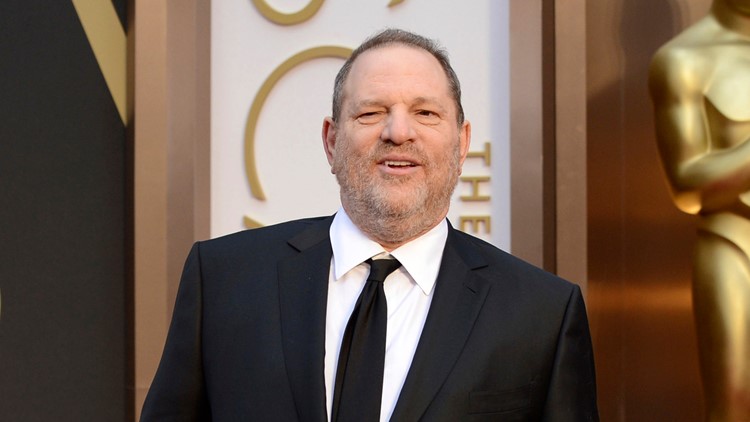WASHINGTON — A prosecutor at Harvey Weinstein's sexual assault trial told jurors Tuesday that the accusers who will testify will tell uncannily similar stories of themselves as young aspiring women who were cornered in hotel rooms by a man who at the time was the definition of Hollywood power.
“Each of these women came forward independent of each other, and none of them knew one another,” Deputy District Attorney Paul Thompson said during his opening statement at Weinstein's Los Angeles trial.
The 70-year-old former movie mogul, already serving a 23-year sentence in New York, is charged with multiple counts of rape and sexual assault in California.
The defense countered in its opening statement that the incidents either did not happen or were consensual sex that the women redefined in the wake of the #MeToo movement.
Weinstein, prosecutor Thompson said, lorded his status as “the most powerful man in Hollywood” over them, talking about the female A-list actors whose careers he had made before growing aggressive.
Thompson played a video presentation with composite photos of the women who will testify and quotes from prior testimonials. Most were aspiring actors. One was an aspiring screenwriter who thought she was going to pitch him a script.
All will testify that Weinstein ignored clear signs that they did not consent, the prosecutor said, including “their shaking bodies, their crying, their backing away from him, their saying ‘no.'" Four women whom Weinstein is not charged with assaulting in the case will also testify about what he did to them to demonstrate his propensity for such acts, Thompson said.
Weinstein attorney Mark Werksman told jurors that what Weinstein did with the women was considered acceptable, “transactional” behavior in Hollywood, where young women were seeking roles and other advantages by having sex with the powerful movie magnate.
“You’ll learn that in Hollywood, sex was a commodity,” Werksman said.
The accusers Weinstein is charged with assaulting are expected to be identified only as Jane Doe in court, but they include Jennifer Siebel Newsom, an actor and documentary filmmaker who is married to California Gov. Gavin Newsom.
Siebel Newsom had not yet met Newsom and was an aspiring actor in 2005 when, according to his indictment, Weinstein raped her at a Beverly Hills Hotel.
Without using her name, both sides said she would testify. Werksman called her a very prominent citizen of California."
“She’s made herself a prominent victim in the #MeToo movement," he added, "otherwise she’d be just another bimbo who slept with Harvey Weinstein to get ahead in Hollywood.”
In a statement to The Associated Press, Elizabeth Fegen, who represents Siebel Newsom and two other Weinstein accusers, called the comments “despicable, desperate, dishonest.”
"The defense is callously engaging in misogynistic name-calling and victim-shaming — but survivors will not be deterred,” she added.
Werksman said Siebel Newsom and many other women in the case had contact, and even initiated dealings, with Weinstein in the years after the encounters, often referring to him affectionately.
In an attempt to head off this strategy, Thompson told jurors that they would hear from a psychologist who will dispel rape myths. Key among them is the idea that a sexual assault victim would not have further contact with their assailant.
Werksman said that Weinstein's consensual acts were transformed in October 2017 with “the asteroid called the #MeToo movement.”
“He became the smoldering, radioactive center of it,” Werksman said. “He is Hollywood's Chernobyl.”
He said that there was suddenly “a new word” for the women, “victim.”
The AP does not typically name people who say they have been sexually abused unless they come forward publicly. Siebel Newsom’s identity was first reported by the Los Angeles Times, and her attorney has told the AP and other news outlets that she is among the women Weinstein is charged with sexually assaulting who will testify during the trial.
The first of Weinstein's accusers to testify, a model and actor who was living and working in Italy when she met him at a film festival in Los Angeles in 2013, said she was stunned to find him knocking at the door of her hotel room after interacting with him briefly earlier that evening.
She said she was more confused than frightened at first, so she let Weinstein in, but he grew more aggressive. She said he eventually forced her to perform oral sex.
“I was crying, choking,” said the woman.
She grew increasingly emotional on the stand until she was sobbing so much that she could no longer speak.
With the court day near an end, Judge Lisa Lench called for a recess until Tuesday morning, when she'll return to the stand.
At the beginning of the day, Weinstein was wheeled into court wearing a suit, and climbed into a seat next to his attorneys.
Confusion arose when Thompson during his opening statement made no mention of one accuser who had been set to testify as recently as last week. Weinstein was indicted on 11 counts overall, four of which involved the woman who was not mentioned. The district attorney's office did not address why the woman was not referenced.
Outside court, Weinstein's attorney said no charges had been dismissed.
“The people left her out of their presentation, so I didn’t mention her,” he said. "It’s a glaring absence, though, in their presentation.”



